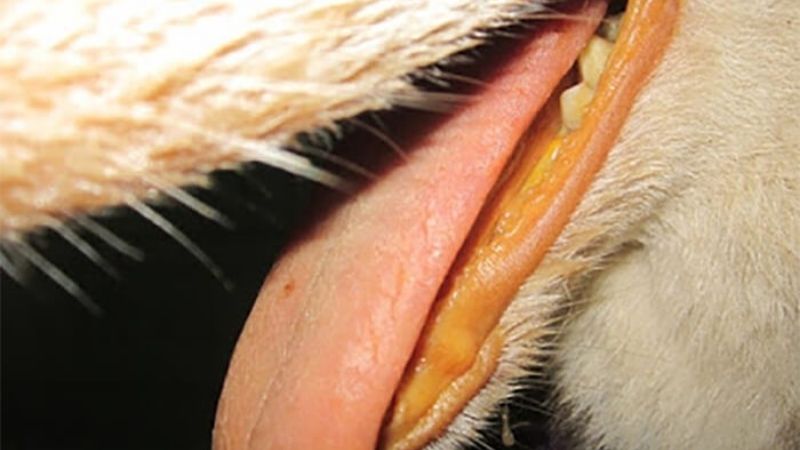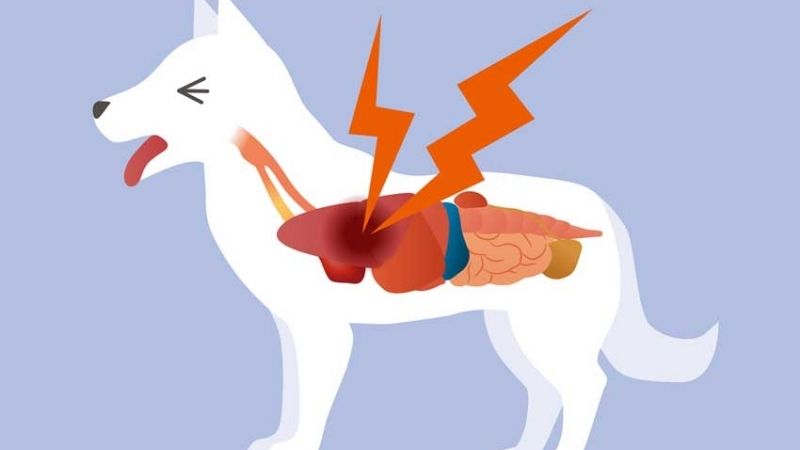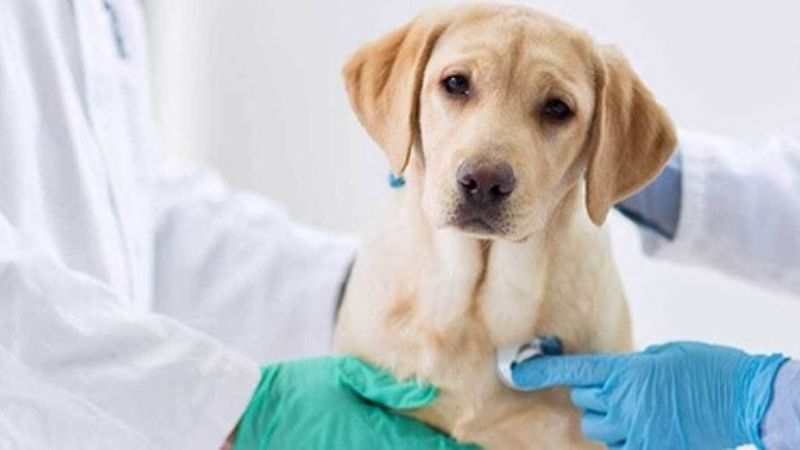Have you ever wondered about the common illnesses that can affect your furry friend? It’s important not to overlook any symptoms as minor, as they can significantly impact your dog’s health if left untreated.
Let’s explore the causes, symptoms, treatment options, and preventive measures for some of the most common canine ailments.
1. Canine Cough or Kennel Cough
 Canine Cough
Canine Cough
Cause
Canine cough, or kennel cough, is caused by the canine parainfluenza virus, often in combination with other respiratory bacteria such as Bordetella bronchiseptica and mycoplasma.
Symptoms
Keep an eye out for the following symptoms: prolonged coughing and hacking lasting 7-21 days, dull eyes with excessive discharge, dry and crusty nose, green nasal discharge, frequent nose licking followed by swallowing, diarrhea with bloody and foul-smelling stools, vomiting yellow mucus, and even sudden death.
Treatment
Here are some at-home treatment options:
- Isolate the sick dog from healthy ones.
- Maintain a clean and dry living environment for your dog, ensuring it is well-ventilated and warm.
- Provide intravenous fluids to your dog.
- Use steam to soothe your dog’s throat.
Prevention
Avoid taking your dog to crowded places or confined spaces with other animals. Additionally, refrain from letting your pet eat or drink indiscriminately in public places. Vaccination is also an effective preventive measure against canine cough. However, consult your veterinarian for advice on the appropriate vaccine.
2. Infectious Hepatitis
 Infectious Hepatitis
Infectious Hepatitis
Cause
Infectious hepatitis in dogs is primarily caused by the canine adenovirus-1 (CAV-1), which enters through the mouth and then spreads through the digestive system to various organs in the body.
Symptoms
In the initial 4-7 days, dogs may lose their appetite and become lethargic. If your dog suddenly stops eating and experiences bloody diarrhea, it indicates an extremely severe form of the disease, and death can occur within a few hours, even without prior symptoms.
In the acute phase, dogs may exhibit a high fever (above 39°C), loss of appetite, diarrhea, and vomiting of blood. They may also exhibit spasms, painful contortions, and subcutaneous bleeding, most noticeably in the abdominal region. Jaundice is a poor prognostic sign.
Treatment
In the case of the extremely severe form, treatment options are limited, and death usually occurs within 2-3 days. There is no specific medication for this disease. Treatment focuses on supportive care, including fluid and electrolyte replacement, glucose and lactated Ringer’s solution administration, avoiding fatty foods, and using antiseptic and antibacterial agents as advised by the veterinarian.
Prevention
- Vaccinate your dog against infectious hepatitis.
- Puppies should receive their first vaccination between 6 and 8 weeks of age, with a booster at 12 weeks, and then annually thereafter.
- If you suspect your dog is infected, isolate it immediately and thoroughly clean its living area and kennel.
3. Leptospirosis
 Leptospirosis
Leptospirosis
Cause
Leptospirosis is a contagious disease caused by the Leptospira interrogans bacterium, which enters the bloodstream and leads to fever, fatigue, and impaired liver and kidney function, ultimately resulting in death.
Symptoms
- Typhoid form: Severe bleeding, vomiting of blood, dark stools with blood, skin and mucous membrane bleeding. Death usually occurs within 24 hours of infection.
- Jaundice form: Conjunctivitis, jaundice, yellow skin, difficulty breathing, loss of appetite, vomiting, foul breath, diarrhea with bleeding. Death typically occurs 5-8 days after infection.
- Yellow belly, drooping ears, drooping feet, and yellow mucous membranes.
Treatment
In the case of acute leptospirosis, hospitalization is necessary. Intravenous fluid administration is crucial to prevent dehydration, and antiemetic medication may be given if the dog is vomiting.
Additionally, antibiotics such as penicillin, tetracycline, fluoroquinolones, and doxycycline should be administered for at least four weeks per course. However, consult your veterinarian before administering any medication.
Prevention
Vaccinate your dog against Leptospirosis as advised by your veterinarian. Maintain a clean living environment for your dog, and prevent contact with the urine of infected dogs.
4. Gastritis in Dogs
 Gastritis in Dogs
Gastritis in Dogs
Cause
Gastritis in dogs can be caused by hookworms, the parvo virus, the coronavirus, or the ingestion of food and water contaminated with bacteria such as Salmonella (typhoid), Clostridium (anaerobic bacteria), or E. coli.
Symptoms
Affected dogs may exhibit a fever, loss of appetite, tremors, persistent vomiting, and severe diarrhea. In the final stage, their stools become dark brown and foul-smelling, and they are unable to walk, only lying in one place. Without proper care, dogs can die within 2-4 days of infection.
Treatment
If your dog shows signs of infection, stop feeding them for the first 24 hours, providing only sufficient water. If your dog is vomiting, you can use anticholinergic medications, as well as chlopromazine or metoclopramide, to provide relief.
Intravenous fluid administration is crucial to replenish lost fluids and electrolytes. If your dog is experiencing abdominal pain, perimidine analgesics can be used, and if they are suffering from diarrhea, a combination of kaolin and pectin or bismuth subcarbonate can be administered.
Prevention
Feed your dog cooked food and refrain from giving it raw meat. Regularly deworm your dog every 3-4 months and vaccinate against the coronavirus and parvovirus.
5. Bronchitis
 Bronchitis
Bronchitis
Cause
Bronchitis in dogs can be caused by bacterial infections, such as streptococcus or staphylococcus aureus, or parasitic infections. It can also be triggered by environmental factors like weather conditions, inhalation of smoke or chemicals, or the aspiration of food and water into the respiratory tract.
Symptoms
Affected dogs may experience coughing, shortness of breath, especially in the morning, wheezing, excessive tearing, and a runny nose. They may also exhibit a high fever, fatigue, loss of appetite, and coughing up mucus.
Treatment
Antibiotics, bronchodilators, and anti-inflammatory medications can be used to treat acute bronchitis in dogs. For chronic bronchitis, anti-inflammatory and cough-suppressing drugs can provide relief.
Prevention
Maintain a clean living environment for your dog, ensuring a warm space in winter and a cool space in summer. Additionally, vaccinate your dog against rabies, the coronavirus, infectious hepatitis, and kennel cough to boost their overall immunity.
6. Pneumonia
 Pneumonia
Pneumonia
Cause
Pneumonia in dogs is caused by respiratory viruses or bacteria such as pneumococcus, streptococcus, klebsiella, and bordetella. It can also be caused by parasitic larvae in the bronchi, such as filaroides, actu strongylus, and paragonimus.
Symptoms
Affected dogs may exhibit fatigue, loss of appetite, high fever, red mucous membranes, night and early morning coughing and hacking, labored breathing, dark red mouth, cyanosis, and they may eventually lie down and remain in one place, appearing weak and breathing rapidly and shallowly.
Treatment
If your dog suddenly stops eating, becomes dehydrated, or has a high fever, seek immediate veterinary attention and hospitalization. If your dog is experiencing respiratory distress, provide oxygen therapy and intravenous fluid therapy to compensate for fluid loss.
Prevention
Maintain a clean and healthy living environment for your pet to reduce the risk of infection. Additionally, regularly vaccinate your dog against diseases such as the coronavirus, parvovirus, rabies, infectious hepatitis, and leptospirosis. Deworming your dog multiple times is also an effective measure to prevent pneumonia.
7. Uterine Infection in Dogs
 Uterine Infection in Dogs
Uterine Infection in Dogs
Cause
In older dogs that have not been spayed, progesterone stimulation can lead to the formation of cysts. These cysts secrete excessive fluid, which accumulates in the uterus, causing it to enlarge. As the condition worsens, the fluid may leak out, and bacteria from the vagina can ascend through the cervix, leading to infection.
Symptoms
- Acute endometritis: High fever, loss of appetite, increased thirst, occasional vomiting, and vaginal discharge of cloudy fluid.
- Chronic endometritis: In this phase, there are noticeable changes, including loss of appetite, white vaginal discharge, a hard and distended abdomen upon palpation, and abdominal swelling.
Treatment
A combination of supplementary medication and supportive care is necessary. Thoroughly irrigate the uterus and vagina with a 0.1% rivanol solution or a 0.1% gentian violet solution once daily for 3-5 days or until improvement is observed.
Prevention
Ensure your dog receives adequate nutrition before and after vaccination. Control the frequency of mating and maintain a clean living environment, providing your dog with sufficient nutrition.
8. Puerperal Hypocalcemia in Nursing Dogs
 Puerperal Hypocalcemia in Nursing Dogs
Puerperal Hypocalcemia in Nursing Dogs
Cause
When a nursing dog produces and releases too much milk at once, it can lead to a decrease in calcium levels below 0.8 mg/ml, causing a calcium imbalance and central nervous system disorders, resulting in puerperal hypocalcemia.
Symptoms
Affected dogs may exhibit a high fever (above 41°C), seizures, rapid breathing, whole-body stiffness, tremors, staggering, and even death if left untreated.
Treatment
Isolate the dog from the puppies and begin cooling the dog’s body temperature by bathing it in cool water or applying cold compresses. Consult your veterinarian, who may administer calcium chloride injections based on the dog’s weight, as well as glucose or saline solutions intravenously.
Prevention
Maintain a clean, cool, and well-ventilated living environment for your dog. Avoid excessive mating and provide a calcium-rich diet. Additionally, ensure your dog is vaccinated against common canine diseases.
































